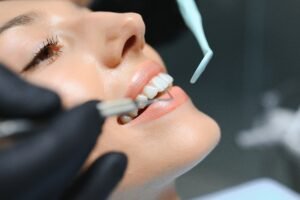Dental health is pivotal to our overall well-being, impacting our oral health, confidence, self-esteem, and systemic health. Dental bridges are one of the robust tools that dentists use to help patients recover their radiant smiles and oral health. So, how exactly can dental bridges improve your smile and health? This article explores this topic in depth.
Before delving into the benefits, it’s essential to understand what dental bridges are. Dental bridges are artificial dental structures used to replace one or more missing teeth. They comprise two or more crowns for the teeth on either side of the gap and a false tooth or teeth in between. These anchoring teeth are known as abutment teeth, while the false teeth are called pontics.
Dental Bridges Improve your Smile and Health
The Impact of Dental Bridges on Your Smile
Missing teeth can detract from a perfect smile, making people self-conscious about their appearance. Dental bridges can improve your smile by filling these gaps. By choosing a bridge that matches your natural teeth’ color, size, and shape, your dentist can provide a solution that blends seamlessly with your smile. This restores the continuity and symmetry of your teeth, enhancing your smile’s appearance and boosting your self-confidence.
When you choose dental bridges in Calgary, we ensure the same is crafted carefully. They’re not merely about replacing the missing tooth functionally but also about matching the aesthetic aspects of your natural teeth. With the help of modern dental technology, dental labs can now create bridges that mimic the translucency, color gradients, and even the tiny grooves found on your natural teeth. This gives the dental bridges a lifelike appearance, making it virtually impossible for others to discern your artificial tooth from the real ones.
1. Dental bridges can improve your health
Prevents Shifting of Remaining Teeth: When you have missing teeth, the remaining teeth may shift towards the space, leading to misalignment. Dental bridges can fill this space, preventing teeth shifting and maintaining proper teeth alignment.
Prevents Bone Loss: The jawbone needs stimulation to maintain its volume and density. This stimulation typically comes from the teeth. When a tooth is missing, the area of the jawbone that held the tooth starts to deteriorate over time, which may lead to facial sagging. Dental bridges can transmit chewing forces to the jawbone through the abutment teeth, preventing bone loss and preserving facial structure.
Improves Chewing and Speaking Ability: Missing teeth can make chewing certain foods difficult and affect speech clarity. Dental bridges replace missing teeth, restoring your ability to chew various foods and articulate words properly, improving your quality of life.
Maintains Oral Health: Dental bridges can improve your oral health by reducing the risk of gum disease, which missing teeth can exacerbate. Filling the gap with a bridge decreases the likelihood of food particles getting trapped, leading to plaque build-up and gum disease.
Must Read: Invisible Alignment: The Invisalign Revolution in Teeth Straightening
2. Caring for Your Dental Bridges
To ensure that your dental bridges can improve your smile and health long-term, taking care of them is critical. This includes maintaining good oral hygiene through regular brushing and flossing, scheduling routine dental check-ups, and avoiding hard or sticky foods that could damage the bridge.
A dental bridge might replace a missing tooth, but it doesn’t absolve you from maintaining good oral hygiene. Regular brushing and flossing remain paramount. Brush at least twice a day, and floss at least once daily. Use fluoride toothpaste to keep your teeth strong and mouthwash to remove bacteria.
When flossing around your dental bridge, a floss threader can be a valuable tool, allowing you to easily thread the floss under the artificial tooth (or teeth) to remove trapped food particles and prevent plaque build-up. In addition to this, interdental brushes, water flossers, or extra can also be handy in cleaning hard-to-reach areas.
3. Careful Diet Choices
While dental bridges are sturdy and made to withstand normal eating habits, some dietary considerations remain. Try to limit the consumption of hard and sticky foods. Foods like hard candies, ice, or sticky caramels can cause damage to the bridge. Over time, such foods can even loosen the bridge.
Also, consider maintaining a balanced diet for overall oral health. Consuming foods rich in calcium, like dairy products or leafy green vegetables, can help strengthen the supporting teeth. Vitamin C-rich foods like citrus fruits can aid in gum health.
4. Routine Dental Check-ups
Schedule regular dental check-ups to ensure your dental bridges remain in good condition and can continue to improve your smile and health. During these visits, your dentist will examine the bridge, the adjacent teeth, and overall oral health to ensure everything is as it should be. They will look for any wear, damage, or gum disease signs. These check-ups are also an excellent opportunity for a professional cleaning, which can help remove plaque and tartar build-up that regular brushing and flossing might miss.
Must Read: Understanding Oral Bacteria’s Role from a Dentist
5. Balancing Bite Forces
Proper bite force distribution is critical to the health and longevity of your teeth and the effectiveness of your chewing and biting. It’s like the well-oiled machine your mouth is designed to be; every tooth plays a role in maintaining this balance.
When you lose a tooth, this balance is disrupted. The remaining teeth must compensate for the lost tooth, bearing more stress than they are naturally designed to handle. This overcompensation can lead to problems such as accelerated tooth wear, temporomandibular joint (TMJ) disorder, or even further tooth loss.
By preventing undue stress on the remaining teeth and the TMJ, dental bridges protect your oral health while ensuring optimal functionality. They enable a comfortable and efficient bite, contributing to the health of your smile in the long run.
Must Read: 10 Everyday Oral Hygiene Tips For Better Health
Wrapping up
Dental bridges are an excellent solution for people missing one or more teeth. Dental bridges can significantly improve your life by restoring a natural-looking smile and contributing to better oral and overall health.
Always consult a dental professional to ensure a dental bridge is the right solution for your dental needs. So yes, dental bridges in Calgary can improve your smile and health, restoring your physical well-being, confidence, and joy.
To consult our dentists in Calgary,















